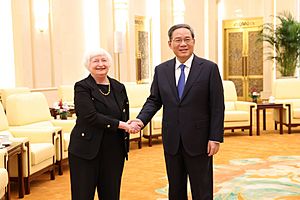Li Qiang facts for kids
Quick facts for kids
Li Qiang
|
|
|---|---|
| 李强 | |
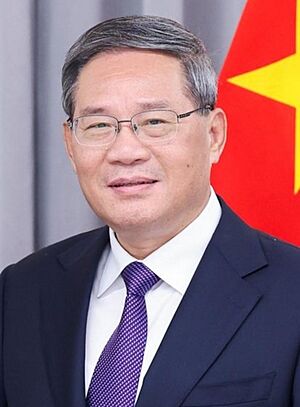
Li in 2024
|
|
| 8th Premier of China | |
| Assumed office 11 March 2023 |
|
| President | Xi Jinping |
| Vice Premier |
|
| Preceded by | Li Keqiang |
| 18th Communist Party Secretary of Shanghai | |
| In office 29 October 2017 – 28 October 2022 |
|
| Mayor |
|
| Preceded by | Han Zheng |
| Succeeded by | Chen Jining |
| 13th Communist Party Secretary of Jiangsu | |
| In office 30 June 2016 – 29 October 2017 |
|
| Governor |
|
| Preceded by | Luo Zhijun |
| Succeeded by | Lou Qinjian |
| 17th Governor of Zhejiang | |
| In office 30 January 2013 – 4 July 2016 Acting: 21 December 2012 – 30 January 2013 |
|
| Party Secretary | Xia Baolong |
| Preceded by | Xia Baolong |
| Succeeded by | Che Jun |
| Personal details | |
| Born | July 1959 (age 65) Rui'an, Zhejiang, China |
| Political party | CCP |
| Alma mater |
|
| Signature |  |
Li Qiang (Chinese: 李强; pinyin: Lǐ Qiáng; born July 1959) is a Chinese politician who has been the eighth and current premier of China since March 2023. He has been elevated to the second-ranking member on the Politburo Standing Committee of the Chinese Communist Party in October 2022. From 2017 to 2022, Li was the party secretary for Shanghai, where he pursued pro-business policies and handled the response to the COVID-19 pandemic.
Li is considered part of the "New Zhijiang Army", the party faction of Xi Jinping, the CCP general secretary and top leader since 2012. The close relationship started in the mid-2000s when both held party positions in Zhejiang Province. Li is generally regarded by observers as pro-business and has voiced support for economic reforms.
Contents
Early life and education
Li was born in Rui'an, Zhejiang in July 1959. He was a worker in the Irrigation Pump Station of Mayu District, Rui'an County from 1976 to 1977, and worked in the Third Tool Factory of Rui'an from 1977 to 1978.
Li Qiang studied agricultural mechanization at the Ningbo Branch of Zhejiang Agricultural University from 1978 to 1982. He studied sociology by correspondence at the private China Sociology Correspondence University in Beijing from 1985 to 1987. Li attended Zhejiang University for on-the-job graduate studies in management engineering from 1995 to 1997 and the Central Party School for on-the-job graduate studies in world economics from 2001 to 2004. He attended Hong Kong Polytechnic University from 2003 to 2005 and received an executive Master of Business Administration in 2005.
Early career
Li joined the Chinese Communist Party (CCP) in April 1983. He worked as a clerk at the Rui'an County Committee of the Communist Youth League of China (CYLC) from 1982 to 1983, and later as the secretary of the committee from 1983 to 1984. He then served in progressively senior roles in the provincial department of civil affairs. He first served as the deputy division head and then division head of the Rural Relief Division of the Zhejiang Provincial Civil Affairs Department from 1984 to 1991. He then served as the director of the Civil Affairs Department's Personnel Division from 1991 to 1992, and finally as the deputy head of the Civil Affairs Department from 1992 to 1996.
In 1996, he became a member of the Party Standing Committee of the prefecture-level city of Jinhua and the Communist Party secretary of the city of county-level city of Yongkang (which is part of Jinhua). In 1998, he was reappointed as the deputy director of the Zhejiang Provincial Government's General Office. In 2000, he became the director and party secretary of the Zhejiang Provincial Government's Bureau of Administration for Industry and Commerce.
In 2002, he was appointed as the party secretary of the prefecture-level city of Wenzhou. By then he was only 43, and was the youngest party secretary of Wenzhou in history. During his tenure in Wenzhou, he supported the development of private businesses in the city. He also gave support to light industry, aiming to create an "international light industry city". In 2004, Li became the secretary-general of Zhejiang Provincial Party Committee and earned a seat on its Standing Committee in the next year, serving under then Zhejiang's party secretary, Xi Jinping, in charge of administration and coordination. During this time, he became close to Xi, eventually being regarded as a close ally of him. In February 2011, he became the Political and Legal Affairs Secretary of Zhejiang province, and several months later was made deputy party secretary.
According to Guangming Daily in 2015, during his tenure in Zhejiang Li told a professor at Zhejiang University that the province's local government needed an "independent think-tank like the RAND Corporation" to evaluate its performance, saying that it was "very difficult" for official organizations and officials to give objective analysis and criticize their superiors. This led the professor to establish a non-governmental group of experts in 2009, with Li as its honorary director.
Local tenures
Zhejiang (2012–2016)
After the 18th CCP National Congress, he became an alternate member of the CCP Central Committee. On December 21, 2012, he became the acting governor of Zhejiang, succeeding Xia Baolong who was promoted to the provincial party secretary, and was officially elected as governor by the Zhejiang Provincial People's Congress on January 30, 2013. During his tenure in Zhejiang, he asked the non-governmental group of experts to write reports on his performance that "tell the truth", and later paid them a visit for a face-to-face feedback after feeling their first reports weren't critical enough. Li also pursued reforms to the administrative review and approval system in Zhejiang.
In 2014, when Zhejiang was preparing to hold an international internet conference, Li proposed that the host city turn into a pilot zone for unblocking China's strict internet controls for Western firms, an idea that was ultimately not approved by the central leadership. He also started a project to create "characteristic towns", small towns focused on one type of business that have a pro-business climate and good physical environments. These included "Dream Town" for tech entrepreneurs and "Chocolate Town" for chocolate producers, both located in Zhejiang. This project was endorsed and spread to rest of China by Xi. The Economist reported in 2023 that "many such towns became speculative hotspots for housing developers, and the kinds of businesses they were supposed to cultivate sometimes failed to take off".
Jiangsu (2016–2017)
On June 30, 2016, Li was named party secretary of Jiangsu province. He was removed as Zhejiang governor on July 4, 2016, when he was succeeded by Che Jun. He served for 15 months, becoming the shortest serving Jiangsu party secretary in the history of the People's Republic. During his tenure, he arranged meetings with business officials such as Jack Ma of Alibaba Group to encourage investments.
Shanghai (2017–2022)
On October 29, 2017, following the 19th Party Congress, Li was appointed as the party secretary of Shanghai, becoming the first official to govern Zhejiang, Jiangsu and Shanghai. He was also appointed as a member of the CCP Politburo in the same year. He is considered to be "business-friendly", having implemented pro-business policies while in Shanghai such as the opening of the Shanghai Stock Exchange STAR Market. He oversaw increasing foreign investment in the city, including the gigafactory of Tesla, Inc. He has also implemented policies like lowering the threshold for internal migrants to obtain residency permits and creating five new towns to lessen the land supply shortage.
In early 2022, Shanghai implemented a two-month COVID-19 lockdown in Shanghai, which significantly impacted the economy, leading Li to be blamed for the handling. Nevertheless, reportedly he was more open to the idea with living with COVID. There were also views that Li was pressured from the Central leadership to implement a lockdown, and that initially, Li had adhered strictly to the guidelines of leading epidemiologists in China, including Zhang Wenhong, who maintained a 'flexible strategy' on anti-Covid measures. It is also said that Li and Zhang had a good personal relationship, as the two were both from Rui'an, a city under the Wenzhou prefecture. According to The Wall Street Journal, Li is one of the few people in the top leadership that wants China to introduce Western mRNA vaccines against COVID-19. Reportedly, he tried to arrange for BioNTech to provide its vaccines in China.
Premiership (2023–)
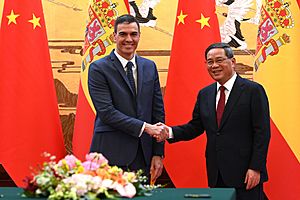
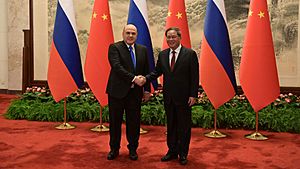
Following the 1st Plenary Session of the 20th CCP Central Committee, held after the closing day of the 20th Party Congress in October 2022, Li was appointed to the CCP Politburo Standing Committee as its second-ranking member. Effectively putting him on track to become the premier, observers speculated that the lack of Central Government experience would make him heavily dependent on support from Xi to run the State Council. On 28 October, he was succeeded by Chen Jining as the party secretary of Shanghai. Reuters reported on 3 March 2023, citing sources, that Li pushed for the quick relaxation of zero-COVID rules in late 2022, resisting pressure from Xi, who wanted to slow the pace of the reopening. It also reported that Li had become the head of the CCP's COVID taskforce, and had also encouraged local governments to continue loosening COVID restrictions.
In December 2022, Li gave attended the opening ceremony of the 13th National Congress of the All-China Federation of Industry and Commerce and gave a speech "on behalf of the Communist Party's Central Committee and the State Council", hinting at his role in the State Council. Li took office as premier on 11 March during the first session of the 14th National People's Congress, taking over from Li Keqiang. He is the first person since Zhou Enlai to rise directly to premiership from local government without any prior working experience in the central government, especially as a vice premier.
In 2024, Li Qiang was named one of the 100 most influential people of 2024 by Time.
Domestic policy
Since becoming the premier, Li has attempted to reassure private entrepreneurs and restore confidence after the damage caused by zero-COVID restrictions, lifted in December 2022, and regulatory campaigns undertaken by the government; he also reportedly persuaded Alibaba Group founder Jack Ma to return to China after he spent a year overseas. On 27 March 2023, he attended the China Development Forum, where he said that China will "unswervingly stick to opening up". He also met many foreign business executives, including Tim Cook of Apple Inc. and Ray Dalio of Bridgewater Associates, who made their first trip to China since the zero-COVID policy ended.
In July 2023, China ended its increased regulatory efforts in the technology sector and Li met with representatives of major tech companies to convey the "strongest signal" in support of the industry. Central government bodies and numerous local governments then introduces policy support for the platform economy designed to increase economic growth and the creation of jobs. During a meeting of the State Council in August 2023, Li called for more efforts to reach China's annual growth target. In September 2023, Li visited several technology companies including Beijing U-Precision Technology, where he called on for technological self reliance. In November 2023, Li Qiang was appointed as the head of the Central Financial Commission, a newly established CCP body overseeing the financial sector. In January 2024, Li called for "forceful" methods to stabilize the Chinese stock market after it registered deep declines.
He visited Hubei province during January 2024 in a trip to emphasize technological independence, where he visited Yangtze Memory Technologies, the Wuhan University, water conservancy projects, a chemical company focusing on green development in Yichang and a battery industrial estate set up by Guangdong Brunp Recycling Technology, a subsidiary of CATL. In the same month, he also visited Shaanxi province, where he paid a trip to Shaanxi Fast Auto Drive Group, the ESWIN Technology Group, a manufacturer of semiconductors used in cars, and Western Superconducting Technologies, full-process producer of niobium-titanium ingot rods; he called on manufacturers to increase investments in research and development. In July 2024, during a symposium with heads of state-owned enterprises, private entrepreneurs and economists, he said China's economy was in "stable operation", while calling for "scientific policy decisions". In August 2024, during a meeting of the State Council, he called on China to introduce policies that are "tangible, effective and accessible to both the public and businesses". In December 2024, he warned local governments to not target private enterprises with unfair fines. The same month, he visited Hangzhou, Shaoxing and Jiaxing in Zhejiang province, where he promised to "steadily expand" access to foreign-invested companies.
In January 2025, Li visited Shandong province, where he called on officials to expand trade-in programmes to boost consumption, expand charging and battery-swapping infrastructure due to the increasing number of new electric vehicles, and accelerate in the building of infrastructure and livelihood projects, including sports venues and modern water networks.
Diplomacy
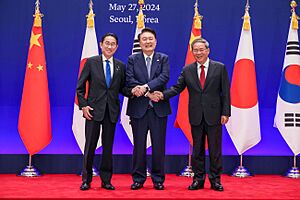
In April 2023, Li met with Japanese foreign minister Yoshimasa Hayashi in Beijing in order to improve ties. In May, Li met with Russian prime minister Mikhail Mishustin, where he the "comprehensive strategic cooperative partnership between China and Russia in the new era", saying that bilateral trade between China and Russia had increased by 40% over the past year. On 19 June 2023, Li started a trip to Germany, his first trip overseas as premier, where he met with president Frank-Walter Steinmeier, chancellor Olaf Scholz, as well as CEOs of large German companies such as Mercedes-Benz, SAP, and Siemens Energy. After four days in Germany, he travelled to France on 21 June, where he met with French president Emmanuel Macron, prime minister Élisabeth Borne, as well as European Council president Charles Michel. Li addressed the World Economic Forum's 14th Annual Meeting of the New Champions in Tianjin, where he said China's economy remained on track and criticized efforts at "derisking".
Between 5 and 8 September, Li visited Jakarta, Indonesia, where he met with various ASEAN leaders. Li additionally met other leaders such as Australian prime minister Anthony Albanese, Japanese prime minister Fumio Kishida and South Korean president Yoon Suk-yeol during various summits such as the ASEAN Plus Three summit and the East Asia Summit. Li Qiang also met with Indonesian president Joko Widodo, vowing $21.7 billion new Chinese investment in Indonesia. Between 9 and 10 September, Li attended the G20 New Delhi summit, going in the place of head of state Xi Jinping, who did not attend. There, he met various leaders such as Italian prime minister Giorgia Meloni, President of the European Commission Ursula von der Leyen, US president Joe Biden, and British prime minister Rishi Sunak.
In January 2024, Li Qiang visited Switzerland and Ireland, and he attended the annual meeting of World Economic Forum in Davos. In April, Li invited Dutch Prime Minister Mark Rutte and German Chancellor Olaf Scholz to visit China. In May, Li met with Russian President Vladimir Putin in Beijing. Between May 26 and May 27, Li attended the China–Japan–South Korea trilateral summit in Seoul, and met with South Korean President Yoon Suk-yeol and Japanese Prime Minister Fumio Kishida.
In March 2024, Li addressed the China Development Forum, where he praised China's economy and promised to lower barriers for foreign businesses. In mid-June 2024, Li Qiang visited New Zealand, where he was hosted by New Zealand Prime Minister Christopher Luxon and Governor-General Cindy Kiro to sign trade and climate change agreements. China agreed to extend visa-free travel to New Zealanders while New Zealand agreed to support Chinese language training and cultural exchange programmes by local Confucius Institutes.
Political views
Economy and business
Li is seen as pro-business and supportive of economic reforms, promoting private sector and service sector development. According to The Economist, "[r]educing bureaucratic interference in the market is one of his favourite themes". In 2003 during his tenure in Wenzhou, he said that "without the private economy, Wenzhou's urban development would be set back by at least a century". In 2014, Li said that "there should be more Alibabas and more Jack Mas". Li said in 2015 that economic reforms were a matter of "life and death" and that "the government cannot be an unlimited government." He also said that "to build a limited yet effective modern government, you need to transfer a lot of managerial power to social organizations." According to The Wall Street Journal, Li has close ties with Jack Ma. The newspaper also reported that Li suggested to the government to ease its regulatory actions against businesses and acted as a mediatory between businesses and the government during the government's crackdown on private businesses. Li has also been supportive of innovation related to information technology and artificial intelligence, and has called for more focus for the "real economy".
Personal life
Unusual in senior Chinese politics, Li has emphasized his local identity, namely his ties to Wenzhou. He set up the World Wenzhounese Conference to encourage members of the global Wenzhounese diaspora to invest back in the city, and told the conference in 2013 that "I was born and bred a Wenzhounese" and "[t]he Wenzhounese spirit of daring to be the first and especially of strong entrepreneurship has always inspired and nourished me".
Li's wife Lin Huan is a retired civil servant, who previously worked in the transportation bureau of the Zhejiang provincial government. The couple have one daughter (Li Ying) who studied in Australia.
See also
 In Spanish: Li Qiang para niños
In Spanish: Li Qiang para niños


